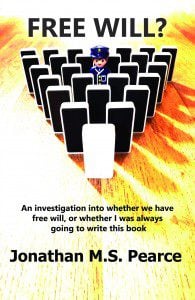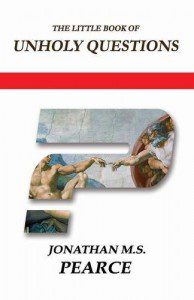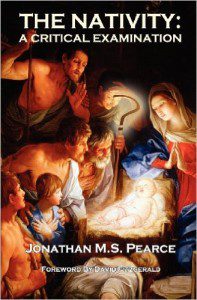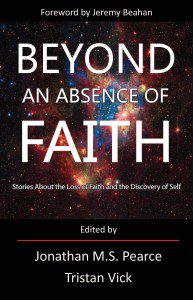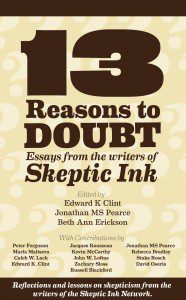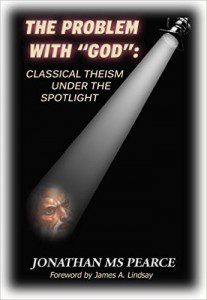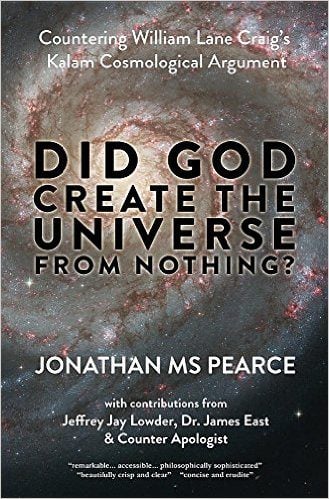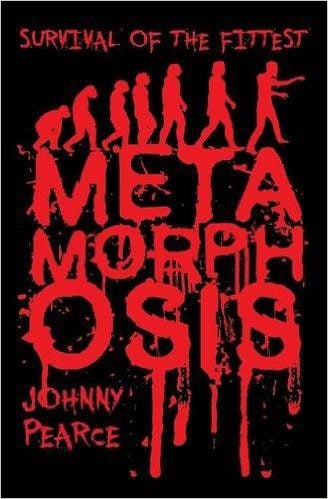Jonathan Pearce has written a number of books over the last few years. Here they are listed with links to Amazon, but if you can’t get them from there, please look somewhere else! below you will find more detail:
- Free Will? An investigation into whether we have free will or whether I was always going to write this book
- The Little Book of Unholy Questions
- The Nativity: A Critical Examination
- Beyond an Absence of Faith: Stories About the Loss of Faith and the Discovery of Self
- 13 Reasons to Doubt
- The Problem with “God”: Classical Theism under the Spotlight
- Did God Create the Universe from Nothing? Countering William Lane Craig’s Kalam Cosmological Argument
- Survival of the Fittest: Metamorphosis
- Not Seeing God: Atheism in the 21st Century
- The Curse of the Maya (A Truth-Seeker’s Story)
- The Family Book of Word of the Day. For a Year. Every Year. Forever.
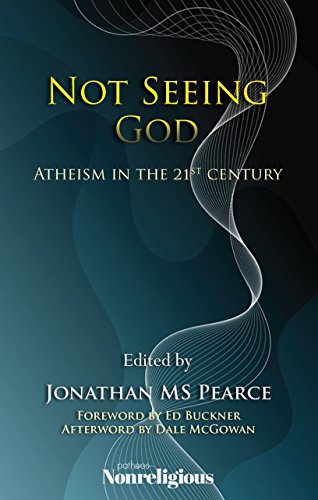
I’ll start with one of my most recent publications: Not Seeing God: Atheism in the 21st Century [UK].This is an anthology of writers from here at Patheos Nonreligious. It’s something I’m really proud of editing and putting together. As the description reads:
Atheism is an evolving worldview – not the single proposition that God does not exist, but everything else that might or might not go with it. With only a single sentence about the existence of single entity, there is huge scope – necessity, even – for having to reasonably work everything else out. It’s a lot more difficult to figure out the world when it’s not handed to you in an old, outdated book. The world is sometimes a complicated place. With this in mind, Not Seeing God looks at the challenges of leaving religion, arguing for atheism, the role and position of atheism in society and where we go from here. This anthology of chapters from the writers of Patheos Nonreligious is a cornucopia of skeptical delights and is a necessary addition to any nonbeliever’s bookshelf, as well as that of the questioning believer. From philosophy to psychology, politics to cinema, the military to folklore, it’s all here in glorious variety, at the crossroad of atheism and society. ..”.this collection has something for everyone to enjoy and ponder… [and] should be considered required reading for the well-informed non-theist.” – Caleb Lack, author and Director of the Seular Therapy Project “Anyone who has even a passing interest in religion or atheism has much–interesting things, important things, fun things–to learn from the writers included in this book.” – Ed Buckner, Former President of American Atheists
My first book is called Free Will? An investigation into whether we have free will or whether I was always going to write this book [UK]. As the annotation reads:
This book is a fine introduction into the age-old philosophical debate as to whether we have free will, or whether we live determined lives. Pearce approaches the subject in a lively manner, explaining terms clearly and using anecdotes to break down some of the heavier philosophy so that it is available to the popular philosophy reader. Now that we are understanding our genetic heritage and our neurology better, can we account for all our characteristics and decisions? The author also looks at how theories of free will and determinism integrate with religion, particularly Christianity. If we live under the illusion of free will, do religions need reassessing? How does free will work when God knows what we are doing in advance? Does God have free will? How does prophecy interfere with free will? How is our justice system affected if we know exactly why people commit crimes? These and other crucial questions are investigated with a deft touch, and the author uses recent and important scientific findings to support the text supplying a valuable overview to the subject.
It has received good reviews, such as this one:
Great, thought-provoking read by Frances “book lover”
I recommend this entertaining and well-argued, mind-blowing book in which the author examines a notion we all seem to take for granted in the West, i.e., our dearly beloved notion of free will. In this book we learn that in spite of the overwhelming dominance of this cherished notion deeply embedded in our cultural, legal and religious belief systems, it is clearly scientifically and demonstratively false and does not exist. First, the author gives us the basic definitions of terms, then examples, philosophical and historical arguments, important religious positions and rebuttals. One of the author’s early hypothetical examples is about a couple going out to dinner and trying to decide what to eat. To “choose” to have pizza, the couple has to rely on many reasons determined by a variety of known and unknown facts concerning their biology, psychology, economic status, childhood and the environment causing their preferences and showing their overriding susceptibility to these kinds of influences that leave no room for a free choice on their part. After the author brought up this couple for the third time, I had to put my Kindle down and go to the kitchen and heat up a pizza! I was falling under the discussion’s suggestion that pizza would taste pretty good right now and I realized I was demonstrating the author’s point about human susceptibility to suggestion and lack of free will by my own spontaneous behavior! The author convincingly shows that determinism is borne out in countless recent scientific discoveries in neuroscience, psychology, biochemistry, physics and genetics which new findings are important and have wide application in all aspects of our lives. There is a new dawn of knowledge exploding around us and our lives depend upon our absorbing many new scientific discoveries in many complex fields. We cannot blame a god or a devil for our circumstances; the author deftly dispatches them from the new matrix. We have to get with the new paradigm and look at how we can improve our critical thinking, how we can make better economic decisions, how we can use our new scientific knowledge to create new art, how we can see one another in a more compassionate light and how we may reform education and the criminal justice system. I recommend this book because we need to make a lot of informed decisions every day and we need all the rational help we can get to understand our common humanity and to develop the full power and beauty of our finite being.
Check it out using the link above or click on the book cover.
My second book remained within the philosophical realm, but this time concentrating on philosophy of religion, namely the characteristics of God. The Little Book of Unholy Questions [UK] is described as follows on the cover:
Jonathan M.S. Pearce’s second book (after Free Will?) continues along the same philosophical and theological vein, aiming to provide a cumulative case against the existence of God, and more specifically, God’s triple characteristics of omniscience, omnipotence and omnibenevolence. Split into useful categories with an introduction to each category, these are questions that demand to be answered adequately and plausibly in order for the believer to retain a rationally-based faith. Pearce’s easy writing style and explanation of philosophy, theology and science on the popular level make this book as enjoyable to read as it is thought-provoking. Does God change his mind when prayed to, and why has he never produced a miracle since biblical times that couldn’t have occurred naturally anyway, like re-growing an amputee’s leg? God only knows.
“Pearce demands from God a rational explanation to all of the problems that seem illogical or incoherent. These are … damningly challenging inconsistencies in the Christian narrative that necessarily antagonize any rational reader. If you are still or used to be Christian, “The Little Book of Unholy Questions” is an overview of the critical questions you need to be asking yourself.” – Derek Murphy, Jesus Potter Harry Christ
And a review selected from the great reviews on amazon:
Easy reading with a profound content
by S.P. Sider
I met Jonathan in a couple of forums over the internet. When the subject is religion and philosophy you surely expect passion and hot debates. But Jonathan stood apart for his calmness and patience, probably due to his teaching background. When I learned he wrote this book, I decided to give it a try. And it was worth it! Don’t be fooled by his philosophy background. Thankfully you will not see any logic equation that would be pretty boring. It’s all in plain English. The format is very interesting: Questions and comments well mixed. You may find some questions very funny, but very often the funnier are the most profound. It’s a book for the believer and non-believer. And that’s very difficult to achieve, a definitive “plus”. Jonathan’s intention is thought provoking and it’s a must for believers who dare to ask questions, and I am sure I made dozens of them when I was a believer. And non-believers will find a bunch of questions they never thought about. My suggestion: read it slowly, taste every question for a couple of minutes. You won’t regret it.
My third book moved towards a different discipline: historical analysis and biblical exegesis, being a synthesis of the work analysing the historicity of the nativity accounts of Jesus’ birth in the Bible. The Nativity: A Critical Examination [UK] is described as follows:
The nativity of Jesus is an event that carries much cultural recognition. However, is it a narrative which commands much support in the academic world? Is it a story which holds much historical truth? Or were the two biblical accounts of the birth of Jesus an opportunity for the authors to impart a theological truth or otherwise? These are the sort of questions that are often asked of the nativity accounts and questions which are answered in this concise and yet well-researched and informative book. Some twenty arguments are looked at and presented in a clear and detailed manner, building a cumulative case for the objection to the historical nature of the Gospel accounts. The author also questions what purpose these stories do serve if indeed they do carry little or no historical truth. With reference to a wide array of contemporary and iconic works on the subject, Pearce has created a compendium of critical arguments against the historicity of a story which still remains a vital piece of our collective cultural and religious tapestry.
“For anyone beginning to doubt the reliability of the gospels as eyewitness accounts, Pearce’s “The Nativity” will teach you everything you need to know to move past the limitations of biblical infallibility and explore the complicated process that went into the gospel narratives of Jesus Christ.” – Derek Murphy, author of Jesus Potter Harry Christ
And a review from amazon:
Did you think you knew the nativity story
By ungodly
When was Jesus born? What was his birth date? Where was he born and why was he born there? Who knew of his birth? How is Jesus related to biblical characters past? Who thought that baby Jesus was the messiah and why? What important historical events do you expect we should have records of if the bible accounts were accurate? If you think you know the answers to these questions, think again. Jonathan Pearce points out how, despite the heartwarming Christmas pageants we are all familiar with, there is no real cohesive narrative regarding the birth of Jesus. It appears that when they originally calculated the year of the nativity in the 6th century, they were averaging two different years as estimated by the two very different accounts of Jesus’ birth given in the bible– both of which seem purposefully manufactured to make Jesus’ birth match the description of the messiah foretold in Jewish prophesy. Step by step, Pearce shows us how it is impossible for both biblical accounts (Luke and Matthew) to be true, and, as we delve into the finer details of each account, it become increasingly obvious that neither account comports with historical facts.(How can a star guide the “three wise men” towards the birth site when a star would move across the sky as the earth rotates and disappears during the day? Why do people think there were “three” wise men anyway when that is not mentioned in the bible?) If the Christian would not accept specious reasoning to suffice as an explanation for another religion’s miraculous claims, this book should give a clear understanding as to why an outsider rejects the bible’s miraculous claims. The Jesus story doesn’t make sense from the get go. This little book is a must-read for Christians brave enough to consider whether their beliefs could be as mythological as conflicting faiths. It’s also a gem for those outside the Christian faith who want to know whether Christianity is built upon a coherent narrative. This, however, is most definitely is not a book for those afraid that their god will damn them to hell unless they believe in the inerrancy of the bible. Before you read this book, ask yourself, “If the nativity story is a myth, would I want to know?”
Next is Beyond an Absence of Faith: Stories About the Loss of Faith and the Discovery of Self [UK].
Leaving one’s religion behind, walking away from faith, is never an easy journey. With family, friends, jobs, and every aspect of one’s life to consider, the decision is not to be taken lightly. This anthology is made up of sixteen fascinating, and at times moving, accounts of such decisions, and the consequences they entail. Whether it be Christianity, Islam or any other life-impacting worldview, leaving it can be a difficult ordeal. This collection details the trials and tribulations, the joy and liberation involved, by people from various walks of life and corners of the globe.
Heartfelt, it offers hope to those equally questioning, and understanding to those who themselves question the motivations of these often brave people.
Here is a review:
Pearce and Vick have brought together a diverse group of voices with one thing in common – they have moved beyond being “former believers” into being active participants in humanity. Each of the stories shared is unique, but former believers will find something they can identify with in every one. From the pain of separation from friends and family, to the joy of being liberated from a sexist mindset, to the harsh reality of having to find a new career in the middle of your life because you have embraced reason, these personal stories help to reinforce for the non-believer that you are not alone in your journey. Instead, you are walking a path many have gone down before, and you can take solace in knowing that these authors have been there as well.
For 13 Reasons to Doubt [UK], I took on an editing role as well as contributing a chapter on free will. This is a great book because it offers a great variety to the skeptical reader.
Extraordinary claims and extraordinary evidence.
The mainstream and social media feed our minds a diet of fringe science and outright pseudoscience. They relentlessly stream paranormal, supernatural, and otherwise extraordinary claims. Where do all these come from? They’re spread by shysters and charlatans, by corporate propagandists with cynical eyes on the bottom line, by priests and preachers of all kinds, by axe-grinding cranks and ideologues, and frequently by well-meaning dupes.
This may be a scientific age, but all too often, science, well-grounded scholarship, evidence, and logic are ignored—or even denied.
Scientific skepticism offers a corrective: skeptics defend science and reason, while demanding the evidence for extraordinary claims.
In this volume, we offer you thirteen ways to scientific skepticism: thirteen reasons to doubt extraordinary claims. The authors discuss groupthink and cognitive biases, science denialism, weird archeology, claims about religion and free will, and many other topics. Within these pages, there is something for anyone who wants to avoid biases and fallacies, cut through the masses of misinformation, and push back against fakers and propagandists.
This review sums it up nicely:
Informed skepticism is one of the most important ways of looking at the world, and Thirteen Reasons to Doubt does a wonderful job of illustrating the need and the challenge of this intellectual virtue.
The essays contained in this short, accessible, charming read challenge some of our dearest notions–for examples, free will, the prevailing attitudes of the groups with which we identify, the trustworthiness of our own abilities to work out problems, and more–and ask us to look at them without simply taking them at face value. As philosopher and skeptic Russell Blackford articulates in his essay, which is written with his usual eloquence and care, we have a heavy burden of intellectual honesty in our current age, one in which propaganda runs rampant in favor of ideologies and faith still stands strong. It is to save ourselves from ourselves when it comes to this peril that informed skepticism proves its worth, and the collaborators on this enjoyable book illustrate clearly what it means, how to cultivate and guard it, what it implies, and how to use it even upon ourselves for self-correction when our biases start to lead us astray.
Each of the contributors, not only Blackford, does a superb job writing with clarity and passion in their areas of expertise, presenting a thought-provoking contribution to several important conversations at once. Thirteen Reasons to Doubt is ambitious and unpretentious, a friendly and welcoming guide of sorts to spotting bull, doubting yourself, and becoming the better thinker for it.
I found Thirteen Reasons to Doubt to be a pleasurable, accessible, quick, and edifying read on the position of informed skepticism, and I heartily recommend it to any who wish to push the clarity of their thinking and their intellectual integrity.
Although there are some books to be released early this year, I have also released a reasonably priced ebook: The Problem with “God”: Classical Theism under the Spotlight [UK]. The description:
This book sets out a cumulative case that puts classical theism, the belief in an all-powerful, -knowing and -loving God, under the spotlight. God is left wanting as Pearce brings together previous blog writing, adapted pieces and original writing to hammer home the point: classical theism is incoherent. This ebook is perfect for armchair philosophers, Christian apologists, and interested atheists and theists everywhere, as well as packing a solid philosophical punch suitable for the more philosophically inclined reader. Something for everyone.
“The Problem with “God” intends to “put classical theism under the spotlight” and on the rack, and that is a goal that it achieves in one concise essay after another. It constitutes a welcome addition to any library of philosophical challenges to the classical, philosophical conception of God, and for that purpose and all need remaining to it, it is pleasantly recommended.” – James A. Lindsay, author of Dot, Dot, Dot: Infinity Plus God Equals Folly.
A review reads:
Think of this as Jonathan Pearce’s greatest hits all compiled together. He is one of the most interesting and convincing philosophers of modern times. Some of my favorite posts are here, which I have at my fingertips when I need its resource.
It was somewhat difficult to read this on my phone, I don’t usually read kindle books, I prefer old school books, but I managed to just finish it.
These blogs are fascinating, deep and well written and persuasively convincing of why theism fails on several accounts. The choice of topics are amazing, and no one can deliver this as good as Pearce can.
If you are a Christian, you won’t find this book rude or obnoxious, it is fair, well balanced and I encourage you to give it a chance. Challenge yourself, for no one will challenge you better than Johnny can.
Excellent selection and content, and Johnny hits another home run
in 2016, I released Did God Create the Universe from Nothing? Countering William Lane Craig’s Kalam Cosmological Argument [UK], which is a critical look at the Kalam Cosmological Argument and how it supposedly concludes that the universe had a cause (i.e. God).
The Kalam Cosmological Argument is a simple argument:
Everything that begins to exist has a cause for its existence;
The universe began to exist;
Therefore, the universe has a cause.
Apologists love to use these three short lines to argue that God is the cause of our universe. Jonathan MS Pearce takes the argument to task and finds it seriously lacking, despite its common appeal. Sounding the death knell for the Kalam, this is a must-have counter to the well-worn religious argument advocated by famous Christian thinkers such as William Lane Craig.
“This is a beautifully crisp and clear introduction to, and discussion of, the Cosmological Argument. Suitable for beginners but also those who want a more insightful and detailed discussion. This is an ideal book for students, and indeed anyone who is interested in what remains one of the most popular arguments for the existence of God.” – Stephen Law, Reader in Philosophy at Heythrop College, University of London and head of Centre for Inquiry UK.
“Pearce has again delivered, treating the important topic, the notorious (and bad) Kalam Cosmological Argument, in a concise and erudite way.” – James A. Lindsay, Ph.D., author of Dot, Dot Dot: Infinity Plus God Equals Folly and Everybody Is Wrong About God
“If you’ve read enough about Kalam to be intrigued and want the thorough takedown, this book is for you.” – Bob Seidensticker, author of Cross Examined: An Unconventional Spiritual Journey and the Cross Examined blog at Patheos.com
..”.remarkable. He has written an accessible, yet philosophically sophisticated, critique of the Kalam Cosmological Argument…. he makes some novel contributions to this literature in the course of his analysis. If you have teethed yourself on popular discussions of atheism and religion, and now want to feast on something a little bit meatier, this is the book for you.” – John Danaher, PhD, Lecturer in Law, NUI Galway (Ireland), and author of the blog Philosophical Disquisitions.
“With his latest book Did God Create the Universe from Nothing?, Jonathan Pearce has collected a vast array of the most powerful academic and popular-level responses to one of the most well-known cosmological arguments for the existence of God. Theists will be surely challenged by this wide-ranging book which seeks to put an end to this theistic argument about the beginning of the universe.” – Justin Schieber, public debater on the philosophy of religion, creator of the channel Real Atheology
“The Kalam argument enjoys much respect that it doesn’t deserve, and Did God Create the Universe from Nothing? gives the unsparing rebuttal that it does deserve. Pearce is a capable and confident Virgil, guiding us through the philosophical and scientific fine points of the response. If you’ve read enough about Kalam to be intrigued and want the thorough takedown, this book is for you.” – Bob Seidensticker, author of Cross Examined: An Unconventional Spiritual Journey and the “Cross Examined” blog at Patheos.com
And almost finally, for now, is my first foray into fiction: Survival of the Fittest: Metamorphosis [UK]. The description is as follows:
No one seems to know where it started. Or exactly when. And certainly not how. But it is here, and everything that everyone holds dear falls prey to the ravages of the virus. Some are unaffected, and they must quickly come to terms with their new world – a dystopian Britain in the early convulsions of collapse.
Follow a disparate collection of people as they fight for their lives in this first installment of the “Survival of the Fittest” series.
Where the journey will take them is anyone’s guess.
“A frightening and credible zombie apocalypse. This is the way the world would end―not with a bang or a whimper, but with a snarl and the gnashing of teeth…” Rebecca Bradley, author of Cadon, Hunter and From Hades With Love “Pearce’s rollicking suburban adventure begs to be consumed and it won’t let go until life is sucked from the final pages.” Glenn Andrew Barr, author of Skin of Them “Johnny Pearce has written a shockingly good zombie story with a literary quality unfamiliar to the genre. Don’t let the slow build fool you―the growing tension plays a vital role in allowing everything to snap with a most satisfying sort of frayed devastation. Once all hell breaks loose it’s a no holds barred gore fest!” Tristan Vick, author of BITTEN: Resurrection and BITTEN 2: Land of the Rising Dead
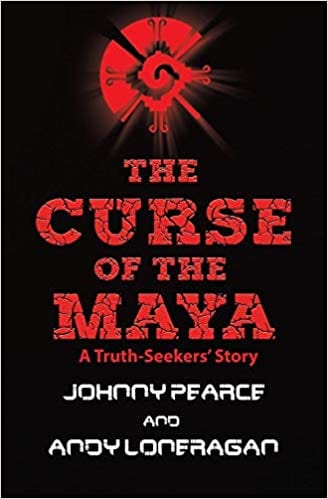
Lastly, for now, my recent release for children of about 9-14, but for anyone really, as it’s a damned good read. In fact, I know a school who is using it as a stimulus text. I even went in to give a reading, give a Q&A and whatnot, and I have never seen children more enthused by a book. They knew more about my characters than I did! Really high praise.
The Curse of the Maya (A Truth-Seeker’s Story) [UK] is a book I am particularly proud of. Grab a relative a copy, or one for yourself!
An early review:
I’m a Year 6 teacher and took this book on holiday for a pre-read with the intention of sharing it with my class if I enjoyed it. I couldn’t put it down! It was such a page turner, just when you think the drama has finished something else happens. I’m looking forward to reading it to my new class this year. It’s very informative and also has lots of opportunities for teaching grammar at year 6 level. I would highly recommend.
Finally, a new addition to the collection is one about words! The Family Book of Word of the Day. For a Year. Every Year. Forever. [UK]:
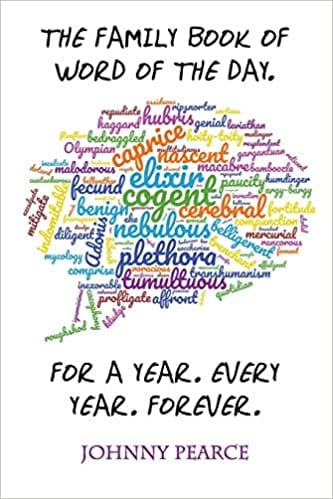
Vocabulary is more important than you think. Indeed, the number of words children know is a strong predictor of a range of outcomes. The more words a child knows early in their lives, the better they will do in terms of literacy later on, and the better they will do in terms of a number of other outcomes. And it’s not just the number of words, but the quality, too, that can affect these outcomes.
With this in mind, this book intends to give the reader another tool to be able to increase the size of their vocabulary to help you improve your outcome, no matter what your age. And, let’s face it, it can be fun to learn new things. Including words!
For each day of the year, a word is provided, along with a definition, and example of how the word might be used, and a comment from the author – an interesting fact associated with the word, some etymology (word history) or some irreverent banter!
“A book full of fun and wonder. I had an English teacher at school (in the sixties) called Mrs Boyd, she was from Northern Ireland and she loved words. She loved them so much that she would often exhort us to ‘taste that beautiful word… roll it around your tongue, isn’t it just grand!) What a beautiful language we have. Johnny Pearce has gathered together some of the tastiest, most mouthwatering and simply scrumptious words and mixed them together to make an etymological amuse bouche. I bought this book for my grandchildren but I think I may just savour it for a while……Bon appetite”
Keep looking for more titles to be released soon!

